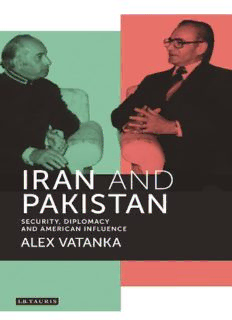Table Of ContentAlex Vatanka is Senior Fellow at the Middle East Institute and
Jamestown Foundation in Washington, DC. A specialist in Middle
Eastern geopolitics with a focus on Iran, he was previously the Senior
Middle East Analyst at Jane’s defence and security group in London.
‘Excellent.Vatankaofferstimelyinsightsintoanimportantgeopolitical
relationship that is often overlooked but is critical to understanding
some of the key elements that have contributed to relations between
Iran, Pakistan and America.’
David Patrikarakos, author of Nuclear Iran:
The Birth of an Atomic State, I.B.Tauris, 2012
‘In tracing the course of Iranian Pakistani taut relations over nearly
seven decades, Vatanka’s lively, thoroughly researched book threads
together those personalities and events that have shaped two of the
mostchallengingcountriesfacedtodaybyWesternpolicymakers.The
bookprovidesforasoundunderstandingofareasofforeignpolicyand
regional and global alliances that once figured so prominently in the
ColdWarandalsonowinthefightagainstglobalmilitantextremism.
The Shi‘i Sunni rivalry, regional nuclear proliferation and the
Americandimensionarealsoilluminatedbythisbook’swide ranging,
engrossing narrative.’
Marvin Weinbaum, Director of the Pakistan Center at Middle
East Institute, Washington, DC and Professor Emeritus
at the University of Illinois at Urbana Champaign
‘A fascinating and enlightening study of the complex and intricate
relationship between two key Islamic states, Iran and Pakistan. This
much neglected connection between the Middle East and South Asia
will only become more important in the future. This book explains
clearly and cogently why that matters.’
Bruce Riedel, Senior Fellow, Brookings Institution
‘This book is an ultimate supreme example of all the works so far
doneonthesubject.Vatanka’scomposition,thesourceshehasconsulted
and the ease with which he expresses himself make this a unique task
of scholarship.’
R.K. (Ruhi) Ramazani, Edward R. Stettinius Professor Emeritus
of Government and Foreign Affairs, University of Virginia
IRAN AND
PAKISTAN
Security, Diplomacy and American Influence
A V
LEX ATANKA
Publishedin2015by
I.B.Tauris&Co.Ltd
London•NewYork
www.ibtauris.com
Copyrightq2015AlexVatanka
TherightofAlexVatankatobeidentifiedastheauthorofthisworkhasbeenasserted
bytheauthorinaccordancewiththeCopyright,DesignsandPatentsAct1988.
Allrightsreserved.Exceptforbriefquotationsinareview,thisbook,oranypartthereof,
maynotbereproduced,storedinorintroducedintoaretrievalsystem,ortransmitted,
inanyformorbyanymeans,electronic,mechanical,photocopying,recordingor
otherwise,withoutthepriorwrittenpermissionofthepublisher.
Everyattempthasbeenmadetogainpermissionfortheuseoftheimagesinthisbook.
Anyomissionswillberectifiedinfutureeditions.
Referencestowebsiteswerecorrectatthetimeofwriting.
InternationalLibraryofIranianStudies57
ISBN:9781784532147
eISBN:9780857725516
AfullCIPrecordforthisbookisavailablefromtheBritishLibrary
AfullCIPrecordisavailablefromtheLibraryofCongress
LibraryofCongressCatalogCardNumber:available
TypesetinGaramondThreebyOKSPrepressServices,Chennai,India
PrintedandboundbyCPIGroup(UK)Ltd,Croydon,CR04YY
To Heidi, Martin, Kathrin and my parents
CONTENTS
Acknowledgements viii
Introduction 1
1. On the Road to India: Iran’s and Pakistan’s
Intertwined History 5
2. 1947 1958: Early Hiccups, as Iran and Pakistan
Both Look to the US for Protection 12
3. 1958 1965: Regional Turbulence and an Unlikely Union 27
4. 1965 1969: The Northern Tier: A Fluid Fault Line 45
5. 1969 71: Iran’s Intervention over the Pakistani Defeat
of 1971 66
6. 1971 77: The Shah and Pakistan’s Reluctant Dependence 82
7. 1977 1988: Zia, the Shah and the Coming of
the Ayatollah 129
8. The Arrival of the Shi‘a Sunni Schism in Relations 171
9. 1988 2001: Geopolitical Foes, Sometime Partners 195
10. 2001 Present: Afghanistan, the Arab Challenge and Iran’s
Soft Power in Pakistan 226
Epilogue 258
Notes 265
Bibliography 291
Index 296
ACKNOWLEDGEMENTS
InIslamabad,IaskedagroupofretiredPakistanidiplomatsaboutaccess
tothearchivesattheForeignMinistry.‘Don’tbotherinquiring,’oneof
them replied. I took that to mean that the archives were simply off
limits to outsiders. But he continued. ‘What you will find about
Pakistani policy deliberations [toward Iran] in the archives in
Washington or London are probably more complete than what you
will find here,’the former Pakistani ambassador insisted.
Asimplausibleasitsoundedatthatparticularmoment,withtimeand
after combing through declassified American and British documents
relatingtoIranian Pakistaniaffairsdatingbacktothelate1940s,Icame
to appreciate the sentiment the Pakistani diplomat was conveying. The
IraniansandthePakistaniseachhave,ofcourse,separateaccountsofevents
relatingtosevendecadesofstate to staterelations.Thatwasnotthepoint.
The pointisthatIranian Pakistani ties, inmomentsof cooperation
or rivalry, have over the years been hugely shaped by their respective
attitudesandinterestsvis a` vistheWesternworld.AndamongWestern
powers, the Americans and the British have beyond question been the
most influential players in this part of the world.
It is in American and British archives one finds important clues or
eventhemissingdetailsthatcanbetterexplaintheactionsofTehranand
Islamabad toward each other over the years. The United States in
particular has since the mid 1960s been the third and undeniable
column inIranian Pakistani relations. And where Washington opts to
stand on relations between these two countries will continue to be
crucial as Iranian Pakistani relations move forward.
ACKNOWLEDGEMENTS ix
Research projects on political history in Iran and Pakistan, as is the
case in most of west Asia, are invariably sensitive. Official archives are
mostlynotavailabletounsanctionedoutsiders.Personalinterviewsand
memoirs, when possible and available, are therefore critical sources.
Accordingly, this book project benefitted greatly from the time and
insights of many individuals.
Ardeshir Zahedi wasmost gracious inhosting me inMontreux.His
many years of working with the Pakistanis as foreign minister and as a
closeconfidantoftheShahofIranmadehimaninvaluableauthority.In
Washington, Assad Homayoun, a former senior Iranian diplomat from
the Shah’s era, was most helpful in his suggestions given his postings
both in Islamabad and later in Washington.
In Rawalpindi, Islamabad and Lahore, Asad Durrani, Shamshad
Ahmad, Talat Masood, Khalid Mahmood, Taqi Bagash, Arif Ayub,
Rasul Baksh Rais, Javid Hussain, Massarrat Abid and Asma Khawaja
were able to open my eyes, and many doors, to leave me deeply
appreciativeofthemakingofPakistaniforeignpolicy.Thanksalsotothe
Institute of Strategic Studies (Islamabad) for generously hosting me.
In Kabul, Haji Mangal, Davood Moradian and Vahid Mojdeh, gave
meimportantfirst handaccountsfromthedaysofSovietoccupationand
Talibanrule.Combinedtheyprovidedmewithastrongunderstanding
ofthenatureofIranian PakistanirivalryonAfghansoil.Thanksalsoto
Shahir Ahmad Zahine, Melek Zahine and Rahim Khan for making my
stay in Kabul a fruitful and wonderfully memorable one.
Among Iranians with government experience in the Islamic
Republic, Abol hassan Bani Sadr, Hossein Mousavian, Abbas Maleki
andAli AkbarOmid Mehrdeservemyspecialthanksforthetimethey
tookouttospeakwithmeonthevariousaspectsofIran’sforeignpolicy
toward Pakistan and Afghanistan in the post 1979 era.
Among former Americanofficials witha wealth ofexperience inthe
region,IamparticularlyindebtedtoMichaelMetrinko,JamesDobbins,
Bruce Riedel, Zalmay Khalilzad, Charlie Naas and Jim Placke. Vali R.
Nasr, F. Gregory Gause III, Ahmad Kamal, Arif Jamal, Toby Dalton,
Yousaf Butt, Ann Wilkens, Vinay Chawla, Rahimullah Yusefzai, Shah
Jahan, Ahmad Etmad and David Mack each helped me along the way.
Meanwhile,thestaffattheofficesoftheAmericanInstituteofPakistan
Studies (AIPS) in Islamabad, the Foundation for Iranian Studies in
Maryland and the Library of Congress in Washington were always
Description:The respective policies of the governments of Iran and Pakistan pose serious challenges to US interests in the Middle East, Asia and beyond. These two regional powers, with a combined population of around 300 million, have been historically intertwined in various cultural, religious and political wa

